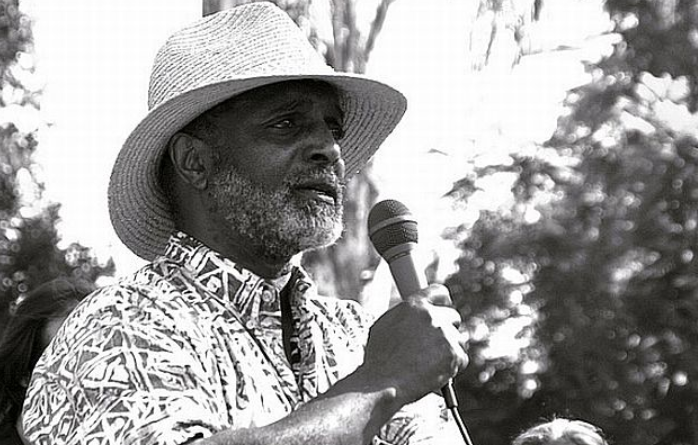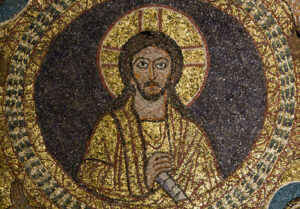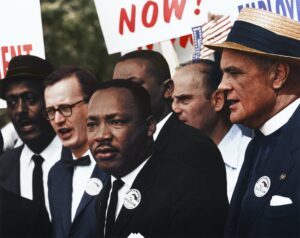Uprisings have emerged all over the world in the wake of the police murders of George Floyd, Breonna Taylor, Tony McDade, and a host of others whose names we may not know. This, erupting soon after Ahmaud Arbery’s murder by white citizens acting as deputies of the law and order in a Georgia town. Increasingly, bi-partisan members of the current political order—the president, democratic governors and mayors, senators—are invoking “law and order” to try and control how protests occur or making a distinction between “peaceful” and “violent” protestors.
Violent protest, we are told, is a threat not only to the legitimacy of the protests, but also to the very social order of the United States. But what if we refused to shy away from the threat that blackness poses to what the black radical thinker, Cedric Robinson, called “the terms of order”?
Understanding Racial Capitalism Today: Law, Order, and Economy
Looting, property destruction, and anti-fascist violence have particularly come under fire as “dangerous distractions” cause by “outside agitators.” And while there is certainly a critique of white anarchists to be made by black leftists, the primary function of these images is to encourage an internal sense of order that constrains our imaginations of black uprising. These anxieties of order are strategies for undermining global rebellions against anti-blackness.
In many ways—as the anxieties about looting and property destruction show—law, order, and economy go together. The law in “law and order” and economy are often quite straightforward to imagine, but it is necessary to consider precisely what is meant by order in these instances and why it is black uprisings that always raise the matter of order so quickly and with such brutal enforcement by the state.
The mistake that many Christian socialists make is reducing a radical understanding of law, order, and economy to class and money. But the inadequacies of these analyses become clear as soon as white leftists attempt to substitute classed terms like “proletarian” as the primary agents of an uprising that is specifically linked to a black radical tradition. As Robin D.G. Kelley argues, explaining Cedric Robinson’s conception of “racial capitalism”:
“Capitalism and racism… did not break from the old order but rather evolved from it to produce a modern world system of “racial capitalism” dependent on slavery, violence, imperialism, and genocide. Capitalism was “racial” not because of some conspiracy to divide workers or justify slavery and dispossession, but because racialism had already permeated Western feudal society.”
While understanding the operations of class is crucial for any radical movement, one rooted in black radical understandings of economy recognizes that race, specifically blackness, is foundational to the imagination of order because it is foundational to the imagination of existence in the West. And it is only by understanding blackness as the primary image of disorder—and so the primary threat to order—in the history of Western societies that we can understand the meaning of law, order, and economy today.
Race and the Order of Redemption
Prior to critiquing the inadequacy of European traditions of Marxism for understanding black radicalism, Robinson also investigated a more basic problem in Western politics. How the political, as a way of thinking about the coherence of society and life together, was imagined in terms of order and models of leadership that presumed an exceptional form of authority, positioning the leader over the people. Robinson links these political presumptions of order, authority, and leadership, to ideas of Christian redemption:
“Political society is no less a Salvationist or redemptionist paradigm than those theologic paradigms out of which it emerged and with which it has had a most constant existential and historical simultaneity.”
Understanding the relationship between a Christian paradigm of redemption and our contemporary political society is critical for revealing Christian order as a matter of racial order. Indeed, Christians’ imaginations of themselves as the people of God is fundamentally a racial narrative. This narrative has depended not only on imagining Christians as replacing or fulfilling Jewish claims of being God’s people, but also on imagining Christian peoplehood as the actualization and preservation of a redeemed status in history.
But to live into this redeemed status in history also meant to live into an imagination of the redeemed against the condemned. Western Christianity’s expansion in the New World project of settler-colonialism and slavery thus relied on a vision of redemptive order as the basis of the racial order that concretized redemption in history. And, importantly for understanding this racial order of redemption, blackness became associated with both a natural heathenness and natural slave status.
⚞ ⚟
Understanding the relationship between a Christian paradigm of redemption and our contemporary political society is critical for revealing Christian order as a matter of racial order.
⚞ ⚟
Understanding the history of redemption as a racial history can clarify our contemporary understanding of race and order. Many scholars have traced the lineage of contemporary neoliberal economics to Christian theological ideas of redemption, authority, and legitimacy. For some, Christian theological ideas of redemption and incarnation help us understand how money operates authoritatively as a mobile image of sovereign states’ power.
For others, Christian redemption’s relationship to damnation explains how neoliberalism demonizes us all, casting individuals as the sole party responsible for any social ills that befall them. But we must read these theories in light of black radicalism and its understanding of how governance under capitalist economies is co-extensive with the governance of existence imagined as racial existence.
For Robinson, ways of ordering existence and ways of ordering knowledge are the primary means for creating social order. Order determines whose existence is seen as meaningful, valuable, and worthy of consideration. Order also determines the assumptions that shape the arrangement of data, narratives, information—in short, knowledge. Order guides our imaginations by telling us not only where to look, but how to see—how to perceive the world around us, thereby determining what interpretations are available.
In the same way that a Christian order of redemption disciplines and forms Christian’s perception of God’s activity over time and in particular places and people’s lives, a political order of redemption also seeks to form citizens perceptions. Western ideas of order are concerned with maintaining proper political order over time (lawfulness) and in place (order). It is through social order that the “proper” mode of perception is enforced, and the social reality created by this political arrangement of existence and knowledge within a given society is taken as objective, common sense, just the waters we swim in.
Black Riots as Black Revelation: The Black Radical Tradition Today
Today it is very popular for Christian leftists to announce that God is on the side of the oppressed, that a divine order of liberation and redemption is a challenge to this political order, and that Christian nationalists are misappropriations of the true liberative core of the Christian message. While these announcements have their use, they also carry the danger of erasing both the history of Christian order as the maintenance of racial order, and the black radical work that went into making black life theologically meaningful, valuable, and a source of theological knowledge.
Black modes of existing and knowing are not simply fodder or energy for leftists movements that see race as supplementary to a universal narrative of proletarian uprising. Such a European genealogy of class that only understands race as a tool of division within a universalizable proletarian position continues to evade how race constitutes the white Western imagination of existence. Because of this failure to perceive the material history of race that sustains contemporary fictions of law, order, and economy, white leftist individuals and organizations continue to preserve the social reality of the status quo.
⚞ ⚟
Black modes of existing and knowing are not simply fodder or energy for leftists movements that see race as supplementary to a universal narrative of proletarian uprising.
⚞ ⚟
What Cedric Robinson’s work makes unavoidable for a leftist understanding of law, order, and economy today is that we must question what order of things governs the perception of reality fostered by socialism. To do so, we must dismantle the assumptions of order that determine how we conceive of class and race. These assumptions are a product of a theological and political order hellbent on condemning black existence and black knowledge as something to be overcome—a threat to a more universal liberation—or as something to be consumed—energy expended, that only finds its value if it pays off in a white Western vision of political theological redemption.
But in learning from Robinson, we can understand black riots as an instance of black revelation. They are events that require the transformation of our perception, inviting us to understand the material and spiritual history of our current reality from the underside.
The social value of existence is a crucial component of how economic order is maintained. And what are we fighting against if not the governance of existence that racial order has made possible? Cedric Robinson’s work helps us to consider what law, order, and economy are meant to preserve. And it is nothing other than a totalizing social reality based on the condemnation of blackness. It is the production and reproduction of this reality that secures the value of social existence in terms of whiteness and its redemption. If this is the case, we must not shy away from how black existence and black thought emerges as an image of disorder.
Looting, property destruction, and physical—sometimes armed—resistance to the state’s and citizenry’s enforcement of white nationalism are a means of contesting the law, order, and economy of an anti-black world and the reality it legitimates. It is only by dismantling the current order that our social existence and knowledge can become adequate to black existence and knowledge, and thus be freed from this order of things. We must begin to learn with Cedric Robinson, with the black radical tradition, that for a revolution at the level of existence and knowledge, our very perception of the nature of reality must be transformed. First comes the black out.
Amaryah Armstrong is an assistant professor of race in American religion and culture at Virginia Tech.




